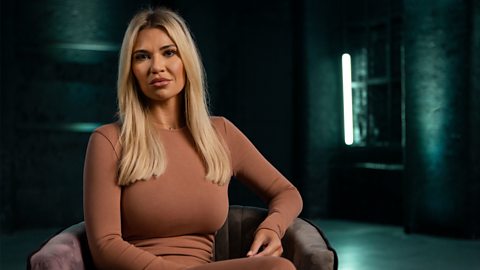As a parent of a neurodivergent child, it can be difficult to comprehend their unique understanding of the world.
In the BBC documentary Inside Our Autistic Minds, presented by Chris Packham, autistic people created films which present their lives in a new light. What can we, as parents, learn about autistic masking, camouflaging and non-speaking autism from these films?

"For much of my early life, I felt completely misunderstood. Like no one knew what was going on inside my head, how different my world was." - Chris Packham
Parents' Toolkit has spoken to Professor Francesca Happé, from King's College London - who has 30 years of experience in specialist research into autism - about two films from the documentary. The films are a collaboration with Flo and Murray - sharing their experience in their own words - as they explore the challenges of autistic masking and communicating without speech.
What is masking?
Stand-up comedian Flo is 28 and lives in Wiltshire with her husband Duncan. Her film focuses on her experience of masking…
In her film, Flo describes to her mum how it feels to mask.
Flo Thank you - slightly overestimated how tall I am there.
Flo To my mum… I knew from a very young age that I was different, we both did. The way I’d sort my toys, I’d insist on different plates for different foods - and birthday parties made me anxious, and by the time I was four years old I became so sure that if I didn’t hide my differences people wouldn’t like me.
Flo So I became a version of myself I thought those around me would accept. I became a mimic, copying other people, imitating normal behaviour, and suppressing anything weird. For most people these rules come naturally, automatically. Their faces match their voices, match their feelings. But I had to think about every little thing. In the end I put so much effort into this mask of normality that nobody could even tell that I had one. When you’re autistic, masking, camouflaging, it’s a survival strategy. Its to avoid judgement or avoid bullying. It’s a way to fit into the non-autistic world.
Flo I have masked with everybody in my life, including you, mum, I wanted to be the perfect child. I wanted to make you proud. But now, I’m tired. It’s exhausting pretending to be normal all the time. I’m beginning to think it might be time to embrace my authentic self to show you the things you don’t normally see. But I’m scared. I’m worried that if I’m quiet and still, and my face doesn’t match my feelings then you’ll think that I’m being rude. I’m worried that if you see me rocking back and forth or flapping my hands then you’ll think that I’m not ok, and I’m worried that if you see me silent, unable to speak you’ll think that I need fixing. It might not come easily for me straight away but I’m ready to be myself. I hope you won’t be disappointed. I love you always. Your daughter, Flo.
Flo’s mum You alright?
Flo Yeah.
Flo’s mum Love you.
Flo I love you.
Flo’s mum I want to scoop up the five year old you and…
Flo Me too.
Flo’s mum …And say its ok.
FloYeah.
Flo’s mum And if we could turn the clock back, and I knew what I know today it would be, maybe I would have been able to give you some reassurance about… it’s ok. It’s absolutely ok you know?
Flo Yeah, all through my childhood and my teenage life and my adult life you’ve been so accepting, I’m going to cry, of everything that I am.
Flo’s mum Because you’re lovely.
Flo I’m alright.
FloBut like, its scary being different, it wasn’t anything about you. It was the world really.
Flo’s mum No but I, please you know you don’t have to mask in front of me anymore.
Flo That’s why, that’s why I wanted this video for you.
Flo’s mumYeah.
Flo I wanted this film to tell you that. But it’s been really hard to go, I’ve always been kind of acting.
Flo’s mum Yeah.
Flo I didn’t expect to get snotty.
Flo’s mum I know, do you want a tissue?
Flo Thank you.
"When you're autistic, masking, camouflaging is a survival strategy. It's to avoid judgement or avoid bullying, it's a way to fit into the non-autistic world. - Flo
“Masking and camouflaging are when people hide parts of themselves or suppress certain behaviours, interests or ways of being that would be natural to them,” explains Professor Happé. “They do this in order to fit in with neurotypical society.”
Thinking about how neurotypical people (people who are not autistic or neurodivergent) mask, can be a helpful way to understand how neurodivergent people mask.
Professor Happé says, “If you think about situations where any of us have had to put on a bit of a mask, if you imagine being in a job interview or something like that, it's pretty stressful and it's tiring, and for how long are you doing that? Probably for half an hour or maybe an hour. Autistic people tell us that the masking that they're having to do is going on 24/7.”
Behaviours which might feel natural to an autistic person could include flapping hands or arms when they’re excited or rocking or pacing up and down to calm themselves. Professor Happé says, “if they have to suppress those behaviours, it might be really quite distressing for them.”
Professor Happé says one reason why autistic people mask is because, “they’ve been bullied or ostracised, for showing those autistic behaviours. And so it really means that we have to become a more neurodiversity inclusive society, and not put all the emphasis on the autistic person to change how they are.”
"I have masked with everybody in my life. Including you mum. I wanted to be the perfect child. I wanted to make you proud." - Flo
Flo talks in the documentary about how she has masked in front of her mum. Professor Happé says, “I think when there's masking at home it’s because it's become routine. But it's often the case too, that parents see a very different picture of their child at home from what teachers see at school.”
“So a child who may mask a lot at school and really keep a lid on their autistic behaviour and interests and so on, may come home and have a real meltdown because they're just exhausted from having to keep that up all the time.”
Autism and conversations
"I love rules in a conversation. I love small talk because if someone goes, ‘How are you doing? How was your day?’ I can go, ‘It was great thank you, how was yours?’ I know what comes next." - Flo
Flo also talks in the documentary about how she likes the rules of day-to-day conversations. Professor Happé explains that, “it's certainly easier for autistic people in general when what goes on is somewhat predictable. If it was all routine, if you knew exactly what you should say, what the other person should say, then you don't have to read the other person's mind.”
“The other thing is that in neurotypical conversations, we say a lot of things that aren't literally true, and that can be very confusing for autistic people. So if I say, I've got to fly, I might just mean I've got to go, rather than I'm going to get a plane. Or if I say, I'll be back in a minute, and I actually take five minutes, that can feel to the autistic person like I've told a lie.”
Non-speaking autism
Murray is 20 years old, lives in Oxfordshire and is non-speaking. Although he doesn't speak he can communicate through the aid of a speech synthesiser.
Murray explains what it is like to be non-speaking...
Photographer Do you want to sit down? Just look straight ahead. That’s really good. Great.
Murray I am an autistic person. It is obvious when you see me. I have no voice but yearn to say so much. If you are willing to listen I will try to say how I feel.
Murray I live in a total blur of information. If I have too many people in a room at one time and one place, it is too overwhelming for me to have to process. I have to jiggle my brain to make it settle. It’s just how I cope. Water takes my pain away because it allows me to lose myself in a place that asks no questions of my abilities. Every drop lets me be me. Before I could communicate through typing, I remember that I was frustrated by people who were kind, but didn’t know my brain was as good as people who can speak. I remember being told that I liked the Teletubbies, which I did, but I wanted to move on and was desperate to read books for my age. Now I have the chance to speak up for people like me. I’m speaking from my heart.
Murray Non-verbal people are pleasing to be around because we sense the world in a deeper way than those who talk. Because we cannot express our emotions instantly we become deep thinkers. People watchers. We have the same dreams as everyone else, so please don’t treat us differently. Each of us is a star eager t be discovered and named in the atmosphere. If you acknowledge our abilities, we can shine brighter. We have so much to say. Please hear us.
Murray’s cousin I think we’re all better people for knowing Murray. He’s made such a big difference to all our lives. We can actually understand how deeply he thinks about things. We’ve been very privileged to be part of his life.
Murray’s dad His whole experience is expressed there in just a few minutes it’s wonderful.
Murray’s mum That just sums up everything about Murray, and it’s just lovely to be telling us how his world is.
Murray I am happy that the world can see a real me.
"I have no voice but yearn to say so much." - Murray
“Perhaps a quarter of autistic people will have minimal spoken language.” says Professor Happé, “many of them will have intellectual disabilities as well.”
Because Murray understands language his situation is fairly rare. “Just a small proportion of autistic people will have good intellectual functioning, good understanding of language but an inability to produce speech. And for some of those, they'll be able to use augmentative and alternative communication devices, (like a tablet or laptop) to independently type for example.”
It’s not uncommon for children to have a delay in speaking. Professor Happé says, “A delay in speaking at the level of your peers is not uncommon at age three or four. When it goes on longer than that, it begins to be more of a concern. If children are not speaking when they're five or six, there will be a concern that without some help, they may not develop speech.”
“At any age, a child who is not yet speaking should be given other ways to communicate. It is really important to put in place alternative modes of communication as soon as possible - whether that's a picture system of communication, Makaton, gesture-based language or an app or device. Having these alternative forms of communication won't stop a child from developing speech.”
Advice for parents
There are lots of resources out there to help you learn more about autism including articles on BBC Bitesize Parents’ Toolkit and information on the National Autistic Society website - see below.
“The more that we understand about autism, the more that we can meet autistic people in a fair way,” says Professor Happé. “You can think about it as a translation between the autistic mind and the neurotypical mind. And the more we understand the person we're translating with, the better we can do that.”
Find out more in the 'My Autistic Self' playlist on BBC Ideas.
Watch both episodes of Chris Packham's documentary Inside Our Autistic Minds on BBC iPlayer.
This article was updated to clarify at what stage AACs and other forms of language assistance might be used to help children.

For further support and reading on autism and diagnosis:
Autism Research Centre at the University of Cambridge.
This BBC Action Line page offers links to organisations that can support parents.
This article was updated to clarify when AACs and other forms of language assistance might be used to help children.

More from BBC Bitesize Parents' Toolkit…
Parents' Toolkit
Fun activities, real-life stories, wellbeing support and loads of helpful advice - we're here for you and your child.
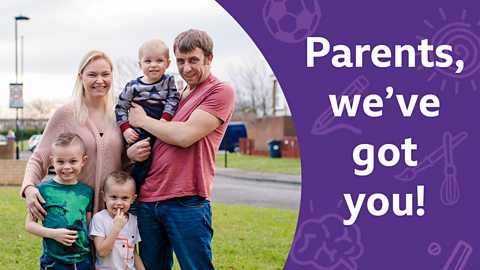
Christine McGuinness - How my autism can help me to help my kids
Christine McGuinness talks about the positives and challenges she's faced through her life as a mum since diagnosis.
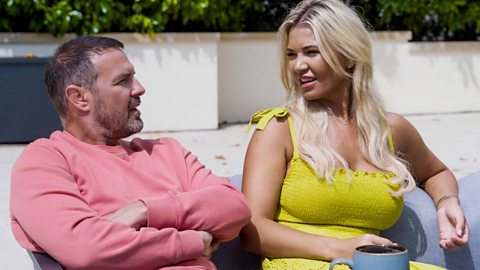
Stories and advice about parenting and autism. collection
A collection of articles with tips for parents of autistic children - covering diagnosis, schooling and personal stories

Schooling tips for parents of autistic children
Advice to help parents of autistic children navigate school life. With tips for parents of children in mainstream and special schools.
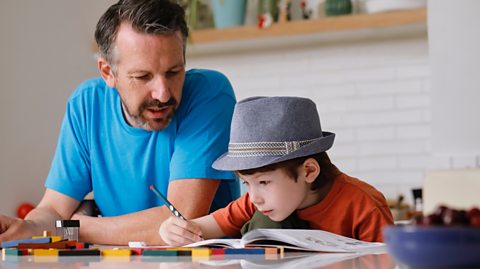
Preparing my autistic children for the return to school
Mum-of-four Rhi offers some advice for helping to prepare your child with an autism diagnosis for the return from home to school.
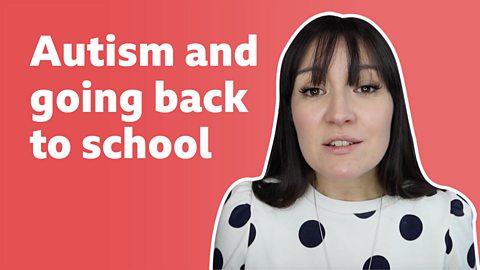
Christine McGuinness: Unmasking My Autism - advice for parents
What is autism 'masking' and how can it help you to understand your child?
